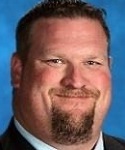
Rep Council Wrap-Up: Spring 2016
May 13, 2016
By Geoff Kimmerly
Second Half editor
The Representative Council of the Michigan High School Athletic Association continued to create opportunities for participation in high school athletics during its annual Spring Meeting, May 1-2, in Glen Arbor, with a pair of actions designed to assist more schools in forming cooperative programs.
The Spring Meeting of the 19-member legislative body of the Association’s more than 1,400 member schools is generally the busiest of its three sessions each year. The Council considered 18 committee proposals and also dealt with a variety of eligibility rule, postseason tournament and operational issues.
Among proposals approved was a recommendation by the MHSAA Classification Committee designed to promote opportunities for schools demonstrating a long-standing lack of participation in baseball, bowling, competitive cheer, cross country, golf, soccer, softball, tennis and wrestling – provided those schools are part of the same public school district or fall under the same governing body. The new exception will allow, by Executive Committee approval, eligible schools to form cooperative programs regardless of enrollment limits placed on other schools and in other sports – currently, schools forming a co-op program in these sports must have an enrollment of fewer than 1,000 students.
The Council also voted to add opportunities for cooperative programs in all sports at the subvarsity level for schools showing a history of lack of participation. Again with Executive Committee approval, two or more member high schools may form a cooperative at the subvarsity level only regardless of student enrollment restrictions that would prevent the same cooperative at the varsity level. Students on these subvarsity cooperative teams would have varsity eligibility only with their school of actual enrollment should they be brought up to a varsity team.
The Council continued its work on health and safety that has been emphasized during the past seven years of an eight-year campaign focused on “4 H’s” – Health Histories, Heads, Heat and Hearts.
The Council approved enhancements to the MHSAA Physical Exam/Clearance/Consent Forms that in part include an annual requirement that students and parents acknowledge reading concussion education information. This enhancement is consistent with requirements of the Michigan Department of Health and Human Services.
A number of changes regarding rules meeting requirements for coaches beginning in 2017-18 also were authorized. Concussion education will be the focus of the meetings’ health and safety section every other year, with other health and safety topics (including overuse injuries, sudden cardiac arrest and heat illness) alternating in off years. High school assistant and subvarsity coaches will be required to complete the same rules/risk management meeting as high school varsity head coaches after previously having additional options by which to satisfy the requirement. At all levels, coaches will not be allowed to coach in the MHSAA tournament for that sport in that season if they do not comply with the rules meeting requirement.
For football, the Council approved a Football Committee recommendation stating that teams, after their first game, should partake in no more than 90 minutes of collision practice per week. Currently, teams are allowed two days of collision practice after their first game, but this new recommendation suggests a minute limit as well. During other days of practice, players still may wear helmets and other protective pads (although neither is mandatory) and practice blocking and tackling technique against pads, shields, sleds or dummies.
The Council also heard plans for the second year of the MHSAA’s sideline concussion testing pilot program and received a summary of the first meeting of the MHSAA Task Force on Multi-Sport Participation.
Here is a summary of other actions taken by the Representative Council at the Spring Meeting, which will take effect during the 2016-17 school year unless noted:
Handbook/Administrative Matters
• Out-of-season coaching rules were adjusted to allow teams of both genders playing the same sport to both host four-player skill group sessions with different coaches but at the same facility at the same time. Currently, only one four-player group in each sport, per school, can train at a facility at one time.
• Additional language regulating competition against out-of-state opponents prohibits MHSAA schools from participating in events involving teams from other states unless all of those teams at the event are bona fide school teams (not sports academy, club or community teams) and are members of their respective National Federation of State High School Associations (NFHS) member high school associations, if eligible.
Sport Matters
• In bowling, the number of athletes allowed on an MHSAA Regionals and Finals roster was reduced from eight to seven after past seasons showed the eighth bowler rarely was involved in competition. Teams may bowl up to five during competition and may still have up to two substitutes, but the roster reduction should reduce congestion in the competition area of bowling centers during events.
• In competitive cheer, the Council approved two committee recommendations intended to make uniforms more consistent for all teams: Beginning during the 2017-18 season, all hair bows must be one solid color and not include adornments; and beginning in 2019-20, all uniforms must be free from cutouts and adornments including sequins, rhinestones, studs, glitter, etc.
• For football, in addition to the collision practice recommendation, the Council voted to allow MHSAA staff to request permission from the National Federation to experiment with using a 40-second play clock for the 2016 season. If granted, individual schools, with agreement of opponents and/or their leagues, may request MHSAA permission to conduct a contest using this timing option. Teams automatically would have 40 seconds to snap the ball from the end of the previous play, rather than the current 25 seconds after the official sets the ball and signals for the play clock to begin. (If play has been stopped by a timeout or penalty, the offense still will have 25 seconds to snap from the time the referee sets the ball and starts the play clock.)
• In golf, the Council approved a committee recommendation to add a sixth Regional tournament for the Lower Peninsula for both girls and boys, allowing for three more teams and three more individual players to qualify for the Lower Peninsula Finals. In adding the sixth Regional, the Council also voted to eliminate Lower Peninsula Districts from the boys tournament, pursuant to the Golf Committee’s recommendation. However, while eliminating one round of play for the boys, the addition of another Regional for both boys and girls will bring the field to 108 players for each gender for the MHSAA championship rounds.
• In ice hockey, an additional option to MHSAA overtime procedures was approved that will allow teams playing a two-game total-goal series to proceed to an overtime shootout after the second game to determine a series winner if the total goals are tied at the end of the two games. Schools must receive MHSAA approval prior to the series start.
• In boys lacrosse, a tournament with eight Regionals advancing champions to four Quarterfinals was approved; the current bracket includes only four Regionals and advances those champions to Semifinals in each division.
• In volleyball, the Council approved an adjustment that standardizes where Class C and D Quarterfinals will be played when including one Upper Peninsula and one Lower Peninsula team. In even years, the Quarterfinal will be played in the Lower Peninsula for Class C and the Upper Peninsula for Class D. In odd years, Class C will be played in the Upper Peninsula and Class D in the Lower Peninsula.
The Council also reviewed reports on membership, with 755 senior high schools and 705 junior high/middle schools in 2015-16; eligibility advancement applications, which totaled five for the year; the use of Educational Transfer Forms, which again held steady this year; school violations, attendance at athletic director in-service workshops and Coaches Advancement Program sessions, officials’ registrations, rules meetings attendance and officials reports submitted for the past three sports seasons. The Association’s $10.7 million budget for the 2016-17 school year also was approved.
The Representative Council is the 19-member legislative body of the MHSAA. All but five are elected by member schools. Four members are appointed by the Council to facilitate representation of females and minorities, and the 19th position is occupied by the Superintendent of Public Instruction or designee.
The MHSAA is a private, not-for-profit corporation of voluntary membership by more than 1,400 public and private senior high schools and junior high/middle schools which exists to develop common rules for athletic eligibility and competition. No government funds or tax dollars support the MHSAA, which was the first such association nationally to not accept membership dues or tournament entry fees from schools. Member schools which enforce these rules are permitted to participate in MHSAA tournaments, which attract more than 1.4 million spectators each year.

Crowley, Lintner & Smelis Named 2022 Bush Award Recipients
By
Geoff Kimmerly
MHSAA.com senior editor
August 11, 2022
Lowell’s Deanne Crowley, Owosso’s Dallas Lintner and Fenton’s Mitch Smelis all have provided more than two decades of service to Michigan educational athletics, Crowley as a highly-regarded coach and administrator, Lintner also as an administrator and educational leader and Smelis as an athletic trainer and prominent voice in the sports medicine community especially in its service to school sports.
To recognize their significant and continued contributions to educational athletics, Crowley, Lintner and Smelis have been named recipients of the Michigan High School Athletic Association’s Allen W. Bush Award for 2022.
Al Bush served as executive director of the MHSAA for 10 years. The award honors individuals for past and continuing service to school athletics as a coach, administrator, official, trainer, doctor or member of the media. The award was developed to bring recognition to people who are giving and serving without a lot of attention. This is the 31st year of the award, with selections made by the MHSAA's Representative Council.
Crowley began her coaching career at Lake Odessa Lakewood in 1987 with subvarsity basketball, and she took over Lowell’s girls varsity program in 2000 after previously beginning her teaching career there in 1998. She remained the Red Arrows’ coach through 2006, that season leading her team to the Class A Semifinals – and she also was named Class A Coach of Year in 2004 by The Associated Press. Crowley became an assistant principal at Lowell in 2010 and the high school’s athletic director in 2013.
 She earned her certified athletic administrator designation from the National Interscholastic Athletic Administrators Association (NIAAA) in 2018 and was named Region 4 Athletic Director of the Year this past school year by the Michigan Interscholastic Athletic Administrators Association (MIAAA). Previously, she was named Athletic Director of the Year by the Michigan Wrestling Association for the 2018-19 school year and by the West Michigan Officials Association in 2021. Crowley also is a significant contributor to Lowell’s nationally-recognized Pink Arrow Pride program that raises funds annually for cancer awareness, education and support within the Lowell community; she organizes and coordinates the education program, which among other goals provides scholarships for Lowell graduates pursuing careers in medicine. She also was a co-founder in 2000 of the Lady Arrows Varsity Club, which provides leadership training for female student-athletes who have earned a varsity letter.
She earned her certified athletic administrator designation from the National Interscholastic Athletic Administrators Association (NIAAA) in 2018 and was named Region 4 Athletic Director of the Year this past school year by the Michigan Interscholastic Athletic Administrators Association (MIAAA). Previously, she was named Athletic Director of the Year by the Michigan Wrestling Association for the 2018-19 school year and by the West Michigan Officials Association in 2021. Crowley also is a significant contributor to Lowell’s nationally-recognized Pink Arrow Pride program that raises funds annually for cancer awareness, education and support within the Lowell community; she organizes and coordinates the education program, which among other goals provides scholarships for Lowell graduates pursuing careers in medicine. She also was a co-founder in 2000 of the Lady Arrows Varsity Club, which provides leadership training for female student-athletes who have earned a varsity letter.
Crowley graduated from Lakewood High School in 1983 and earned her bachelor’s degree in secondary education from Western Michigan University in 1997 and a master’s in educational administration from Michigan State University in 2002.
“I have known Dee for over 20 years, and she has always been incredibly dedicated to finding opportunities for all students, especially female student-athletes,” Uyl said. “Her years as a coach and administrator have shown a solid record of finding ways for kids to compete.”
Lintner is returning to Owosso High School as principal this fall after finishing the second half of 2021-22 as interim athletic director at Fenton High School. He first joined the staff at Owosso as a teacher in 2001-02, went to Linden as athletic director for two years beginning with fall of 2008, then returned to Owosso as athletic director and assistant principal from 2010 through the 2020-21 school year. He served as principal at Owosso Lincoln High School last school year until leaving for Fenton.
 Education has been a focus of Lintner’s work, and he received a doctorate in educational leadership from University of Michigan-Flint in 2017. He has a certified master athletic administrator designation and has served as a leadership training instructor for the NIAAA since 2015. He also has served as a facilitator for the Love and Logic parenting program.
Education has been a focus of Lintner’s work, and he received a doctorate in educational leadership from University of Michigan-Flint in 2017. He has a certified master athletic administrator designation and has served as a leadership training instructor for the NIAAA since 2015. He also has served as a facilitator for the Love and Logic parenting program.
Lintner has been an active participant with the MIAAA as well, serving as its constitution committee chairperson since 2009. He was a member of the executive board from 2015-20, including serving as president during the 2018-19 school year. As athletic director, he was a frequent host of MHSAA postseason events and a contributor to various committees, and he previously was an MHSAA registered official for track & field and coach in multiple sports. Prior to earning his doctorate, Lintner graduated from Vassar High School in 1995, then earned a bachelor's degree in education from Saginaw Valley State University in 2000 and a master’s in athletic administration from Central Michigan University in 2005.
“Dallas has provided years of solid leadership in Owosso,” MHSAA Executive Director Mark Uyl said. “This consistent approach has led to numerous improvements, and during his tenure as athletic director his school won its first state championship, with the softball program (in 2021).”
Smelis has served as an athletic trainer for 25 years with Fenton Area Public Schools, for the last decade through NovaCare Rehabilitation. He was named High School Athletic Trainer of the Year by the Michigan Athletic Trainers’ Society (MATS) in 2017 and serves as co-chairperson of its Secondary School Committee.
 Also a member of the National Athletic Trainers Association (NATA) and Great Lakes Athletic Trainers Association (GLATA), Smelis has become a key connection between the training community and MHSAA. He has contributed as a MATS liaison on multiple MHSAA sport committees, and serves on the Sports Medicine Advisory Committee and as an instructor for the MHSAA’s Coaches Advancement Program (CAP). He also has presented at the MIAAA’s annual and summer conferences on a variety of physical health and safety and mental health topics.
Also a member of the National Athletic Trainers Association (NATA) and Great Lakes Athletic Trainers Association (GLATA), Smelis has become a key connection between the training community and MHSAA. He has contributed as a MATS liaison on multiple MHSAA sport committees, and serves on the Sports Medicine Advisory Committee and as an instructor for the MHSAA’s Coaches Advancement Program (CAP). He also has presented at the MIAAA’s annual and summer conferences on a variety of physical health and safety and mental health topics.
Smelis graduated from Imlay City High School in 1991 and earned a bachelor’s degree in sports medicine from Central Michigan University in 1997. He is a certified American Heart Association instructor for CPR, first aid and basic life support and has served as lead instructor in CPR and first aid for Fenton’s coaches and staff.
“Mitch has been incredibly dedicated to keeping kids safe while playing all sports,” Uyl said. “He also has been responsible for further strengthening the good relationship between the MHSAA and Michigan Athletic Trainers’ Society, and he continues to provide valuable insight as part of our coaches education efforts.”

